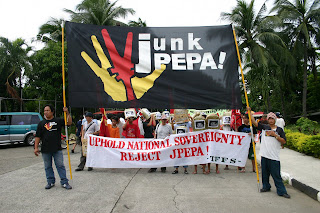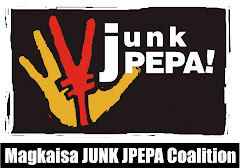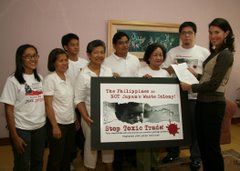The Philippine Senate MUST REJECT the JPEPA.
1. The JPEPA is a mega-treaty, a first of its kind for the Philippines; covering not only trade in goods but also services, investments, government procurement, and other matters. Its implications are massive on a political, social, and economic level.
2. Today, the JPEPA is currently being heard at the Senate. Pursuant to the Constitution, the Senators can only cast a YES or a NO vote for this treaty. The Senate has no power to make amendments or modifications. They can either accept it or reject it, as a whole.
3. The secrecy, lack of public disclosure and exclusion of stakeholders, in the processes leading to the adoption of JPEPA, violate the people’s right to participate in matters of public interest. Akbayan representatives and concerned groups had to file a Supreme Court case in order to even get a copy of the full text and annexes of the JPEPA.
4. For such a comprehensive treaty, the Philippine negotiators bargained away our future and failed to do their homework. The Joint Coordinating Team Report on the JPEPA states that “the Japanese side provided studies of macro-economic impact of JPEPA.” One of these studies is the source of the much-publicized 3.03% incremental increase in GDP if the Philippine Senate votes to accept JPEPA.Why did we not do our own study?
5. Toxic and hazardous wastes are scheduled for tariff elimination despite clear national laws and international commitments. To address the massive protests on the matter, a side note, of dubious legal validity, was subsequently issued to supposedly "fix" the problem but the same note covers only toxic wastes. Clinical and municipal wastes remain. To even include toxic and hazardous wastes, serious threats to our health, our environment, and our lives, is a blatant disregard of the rights of the Filipino people.
6. Contrary to the administration’s repeated media statements, Article 93 of the JPEPA reveals that the Philippines waived its right to demand from Japanese investors the obligation to transfer their technology to assist their Filipino partners. The Philippines also surrendered the right to require Japanese investors to hire a given level of Filipinos. This voluntary surrender of rights has not been done by Malaysia, Indonesia, and Thailand. Even Singapore refused to surrender its right to require Japanese investors to “appoint, as executives, managers or members of boards of directors, individuals of any particular nationality,” including those of its own.
7. Article 4 of the JPEPA, a blatant usurpation of legislative power, ties the hands of the Senate and the House of Representatives and requires them to "examine the possibility of amending or repealing laws and regulations that pertain to or affect the implementation and operation of this Agreement, if the circumstances or objectives giving rise to their adoption no longer exist or if such circumstances or objectives can be addressed in a less trade-restrictive manner." This provision does not exist in Japan's agreements with Malaysia, Indonesia, and Thailand. This provision also did not exist in the 2003 Working Draft of the JPEPA.
8. For the Filipino nurses, considered to be among the best in the world, our Philippine negotiators are offering to send them to Japan as nurse aides who are slapped with excessive language and training requirements. While nurses from Indonesia are required only 2 years of work experience and a 3-year nursing course without a national licensure exam, our Philippine negotiators agreed to the requirement of 3 years of work experience for our nurses who undergo 4 years of nursing education and who must pass the national licensure exam.
9. In terms of market access, JPEPA is clearly lopsided in favor of Japanese agricultural and industrial products. The Philippines will drastically eliminate tariffs on agricultural products except for rice (5 tariff lines) and salt. On the other hand, Japan was able to exclude 238 tariff lines, which include a wide range of fish and marine products, vegetables, fruits, seaweed, and footwear. There is much doubt about market access claims raised by the negotiators. For seaweeds, some of the species, for which Japan has made commitments for tariff elimination, do not even grow and/or are not even farmed in the Philippines.
10. Article 27 of the JPEPA mentions cooperation in relation to used four-wheeled motor vehicles; a clear violation of Executive Order 156 that prohibits the importation thereof. It is a clear disregard of a 2006 ruling by the Supreme Court that upheld the validity of the said law. The negotiators have repeatedly said in various fora that national laws will be respected but Annex 1: Notes of the JPEPA clearly show that "On the request of either Party, the Parties shall negotiate on issue such as market access conditions on used motor vehicles." Furthermore, the provisions in Article 27 do not exist in Japan's agreements with Malaysia, Indonesia, and Thailand. This provision also did not exist in the 2003 Working Draft of the JPEPA.This commitment is a serious threat to the 77,000 workers of the automotive industry.
11. Contrary to the administration’s claim that JPEPA will spur economic growth for the entire country, one of the studies conducted on the JPEPA by the Philippine Institute for Development Studies, a non-stock, non-profit government research institution, concludes that with JPEPA, “agriculture wages decline” and “unemployment rate in agriculture labor deteriorates.”
12. JPEPA will restrict local government autonomy, legislative and taxation powers.
13. The administration of the treaty will create bureaucratic and financial nightmares that will effectively wipeout whatever little economic benefits there may be under JPEPA.
14. The JPEPA is but the first in a long line of free trade and economic partnership agreements currently being negotiated by the Philippines, and it will set the stage for all future trade and investment agreements. If we cannot strategically defend our interests in this treaty, what kind of future can we promise to the Filipino people?
15. The Executive branch’s insistence that JPEPA be concurred with because the Philippines cannot afford "to miss the boat" as the other Asian countries are negotiating "similar" economic partnership agreements with Japan, is inaccurate. The actual text of the JPEPA and the Philippines' severely limited protections for its own sectors indicate that the negotiators have already caused the Philippines to miss the boat. Surely, the Filipino people deserve a better boat.
This is about our jobs. Our families. Our lives.
We have faith in our Senators.
JUNK JPEPA.
-----
Friday, Sept. 14, 2007: Senators slam "fuzzy" gov't presentation of JPEPA.Read here.
Saturday, Sept. 15, 2007, Philippine Daily Inquirer, page A9: Senators not impressed on JPEPA.
news found here.
** The Coalition accepts volunteers (lawyers, economists, writers, students, etc). We cannot pay everyone but we can feed you.:) Please feel free to email us.
We need your help.




























